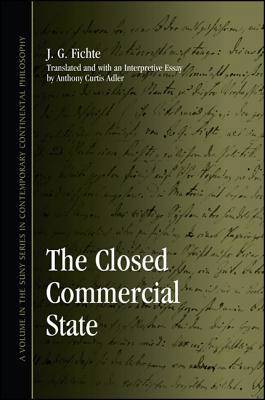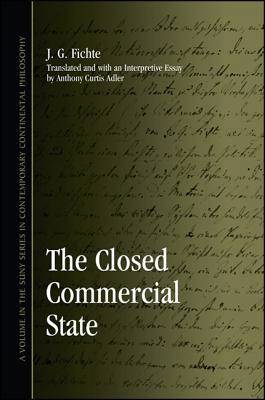
- Afhalen na 1 uur in een winkel met voorraad
- Gratis thuislevering in België vanaf € 30
- Ruim aanbod met 7 miljoen producten
- Afhalen na 1 uur in een winkel met voorraad
- Gratis thuislevering in België vanaf € 30
- Ruim aanbod met 7 miljoen producten
Zoeken
Omschrijving
Appearing for the first time in a complete English translation, The Closed Commercial State represents the most sustained attempt of J. G. Fichte, the famed author of The Doctrine of Science, to apply idealistic philosophy to political economy. In the accompanying interpretive essay, Anthony Curtis Adler challenges the conventional scholarly view of The Closed Commercial State as a curious footnote to Fichte's thought. The Closed Commercial State, which Fichte himself regarded as his "best, most thought-through work," not only attests to a life-long interest in economics, but is of critical importance to his entire philosophical project. Carefully unpacking the philosophical nuances of Fichte's argument and its complex relationship to other texts in his oeuvre, Adler argues that The Closed Commercial State presents an understanding of the nature of history, and the relation of history to politics, that differs significantly from the teleological notions of history advanced by Schelling and later Hegel. This critical scholarly edition includes a German-English glossary, annotations, and page references to both major German editions.
Specificaties
Betrokkenen
- Auteur(s):
- Vertaler(s):
- Uitgeverij:
Inhoud
- Aantal bladzijden:
- 259
- Taal:
- Engels
- Reeks:
Eigenschappen
- Productcode (EAN):
- 9781438440217
- Verschijningsdatum:
- 9/06/2012
- Uitvoering:
- Hardcover
- Formaat:
- Genaaid
- Afmetingen:
- 157 mm x 234 mm
- Gewicht:
- 498 g

Alleen bij Standaard Boekhandel
+ 302 punten op je klantenkaart van Standaard Boekhandel
Beoordelingen
We publiceren alleen reviews die voldoen aan de voorwaarden voor reviews. Bekijk onze voorwaarden voor reviews.











